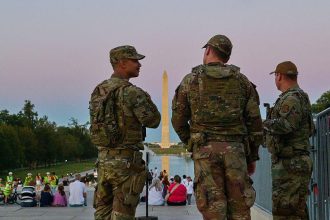The Comptroller-General of Customs, Bashir Adeniyi, on Friday said Nigeria will host a continent-wide conference of Customs leaders and operators from November 17 – 19, 2025, with at least 30 African customs administrations already confirmed and the World Customs Organisation Secretary-General, Ian Saunders, is scheduled to deliver a keynote address.
Adeniyi said the forum, designed to align Customs’ role in the African Continental Free Trade Area and tear down non-tariff barriers, has attracted a private-sector majority across shipping, aviation, ports, manufacturing, banking and logistics.
“As we speak, we already have confirmed registration from about 30 African customs administrations. Out of these 30, 22 of them are at the Director General’s level. Others are represented,” Adeniyi told State House correspondents when he appeared on this month’s edition of Meet-the-Press organised by the Presidential Communications Team at the Aso Rock Villa, Abuja.
Adeniyi, who did not mention the countries represented, added that delegations are drawn from West, Central, East, Southern and North Africa.
He noted long-standing complaints that goods granted AfCFTA preferences at origin sometimes lose concessions upon arrival at the destination.
“Now we have confirmation of participation from West and Central Africa. We have those coming from East and South Africa, and those coming from the north.
“Most of the time, when these goods get to the destination country, they do not get the same kind of benefit concessions. And this has created a problem for us,” he explained.
He said the design is deliberately operator-led, with economic players outnumbering public officials on registrations.
He stated, “Beyond Customs, we are also inviting economic operators that are involved in managing cross-border trade in Africa.
“We’ve discovered that we have more private sector operatives who have registered for this conference, more than those in the public sector.
“Governments don’t trade, customs don’t trade, the banks will not trade, but it is the economic operators that will trade, and we are happy that they have embraced the initiatives and they are going to be with us.”
He said the forum will allow operators to brief customs chiefs and policymakers on the barriers they face.
“On Monday, for example, our intention, instead of starting with the delivery of papers and all of that, we really want to start with the private sector. We want to take a deep dive into their operations, understand the challenges that they are facing in trading across Africa.
“We’ve invited people from different parts of Africa so that they will come to talk to customs and the policymakers on their challenges, the frustrations they have, the continued reduction or retention of some non-tariff barriers to trade, which we also know about, and we are not shy to admit that there are some problems here and there, and it’s not just going to be a Nigerian issue,” Adeniyi said.
He said the Abuja conference will hard-wire customs administrations into AfCFTA implementation and align them with operators and financiers to resolve practical hurdles at borders.
Fielding questions from journalists, Adeniyi explained why the new de minimis regime for low-value imports, e-commerce parcels and passenger baggage replaced the long-obsolete N50,000 levy with a $300 benchmark.
He added, “We needed to review the threshold that we needed to collect customs duty on when people travel.
“What our law said before was the equivalent of N50,000. We know that N50,000 is next to nothing, and that is what has created issues when people arrive at our border stations or airports, and we ask them to pay duties on what they are bringing in. That was why the new threshold of the equivalent of $300 is now the threshold.”
He stressed that items above $300 are subject to duty, and that multiple-size, bulk “gifts” no longer qualify as personal effects.
“So, if you show up at any customs arrival port with anything valued over $300, it is expected that you will pay duty. When it is a personal effect, we know that these are things that are on you, subject to a reasonable quantity.
“So you come in with 10 pairs of shoes and four of them are size 43, and the others are of various sizes, then this is no longer the shoe that you are going to wear. We don’t count it as personal effects again,” he explained.
The Nigeria Customs Service Board formally approved a $300 de minimis threshold effective September 8, 2025, covering low-value consignments and passenger baggage to speed clearance and align with global practice.
It said the policy, limited to four usages per annum, aims to unclog airports and support cross-border e-commerce while keeping prohibited items taxable and controlled.
Under AfCFTA, tariff preferences are phased down to 0 per cent for qualifying goods based on Rules of Origin, with ECOWAS-style compensation mechanisms helping cushion the foregone duties, the CG underscored while defending trade facilitation alongside revenue needs.









